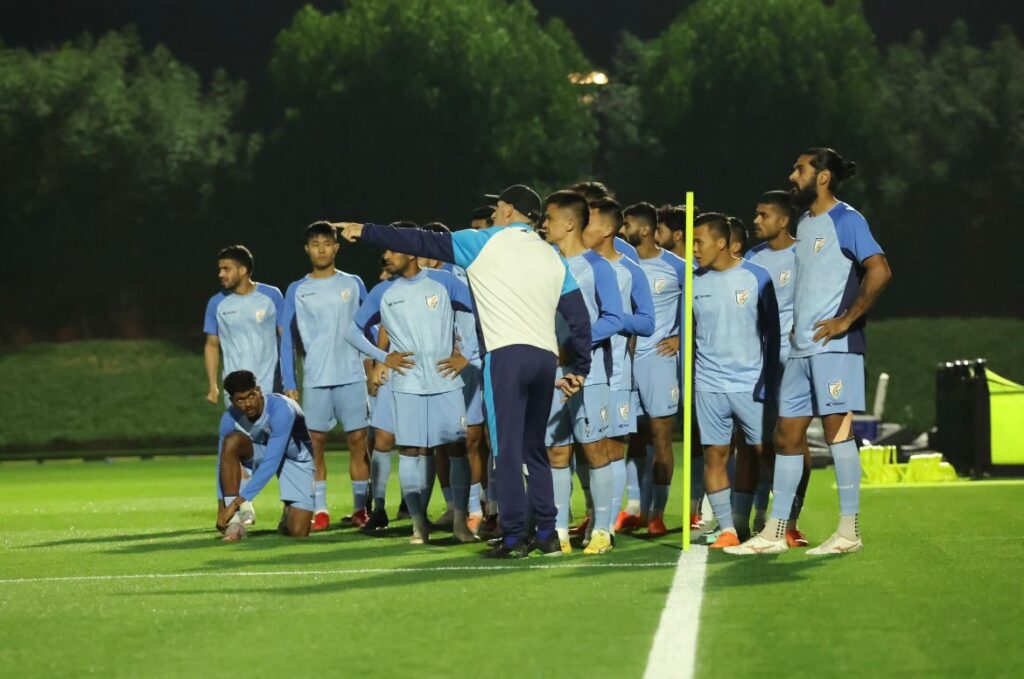 Practice session for the Indian football team. Credits ( Indian Football Team Twitter)
Practice session for the Indian football team. Credits ( Indian Football Team Twitter)
Swapnil Mukherjee and Rahul Giri in Doha
It will always be a source of great regret for Australian football fans that the team didn’t qualify for the World Cup at a time when the likes of Harry Kewell and Mark Viduka – the best players they’ve ever produced – were in their prime. Had Australia been part of the Asian Football Confederation (AFC) back then, that team would have breezed through qualifying. Instead, as representatives of Oceania between 1966 and 2005, Australia had to endure heartbreaking play-off losses against the likes of Scotland (1986), Argentina (1994), Iran (1998) and Uruguay (2002).
If John Aloisi’s winning penalty against Uruguay at the end of the play-off for the 2006 World Cup is still considered the most important kick in Australian football history, that’s with good reason. Viduka, then with Middlesbrough after his glory years with Glasgow Celtic and Leeds United, and Kewell, a peripheral figure at Liverpool, were past their best, but for a team that had waited 32 years for a second shot at the big time, that didn’t matter.
Rale Rasic, the Yugoslav-born coach who took them to West Germany in 1974 – they lost to the hosts and East Germany, and drew with Chile – always claimed he was sacked afterwards for not being “Aussie” [of the Anglo-Saxon variety] enough. And there’s little doubt that football in Australia grew largely as a result of the passion for it among the immigrant communities in Sydney and Melbourne – the Yugoslavs and the Greeks, in particular. Even today, you won’t be able to walk through parts of those two big cities without seeing tattoos and scarves in shop windows paying homage to the likes of Olympiakos, AEK Athens, Red Star Belgrade and Dinamo Zagreb.
Ange Postecoglou, who coached Australia to the Asian Cup on home soil in 2015, emigrated down under as a young boy. Les Murray, the face of Australian football broadcasting till his death in 2017, was born László Ürge in Budapest in 1945. Viduka, who now runs a café in Zagreb, is the older cousin of Luka Modrić, Croatian football legend.
It’s a sign of the times though that Australia no longer have things their own way even in Asia. The golden generation of Kewell, Viduka and Tim Cahill – record goal-scorer for the Socceroos with 50 – is long gone, and there are no Australians who are regulars at any of Europe’s biggest clubs. After starting the final round of Asian World Cup qualifying for Qatar 2022 with three straight wins, Australia went on a disastrous run that meant they needed a play-off win against Peru to clinch their place at the top table.
In Asia too, there have been missteps. In Graham Arnold’s first spell in charge more than 15 years ago, they were well beaten by Iraq, the surprise champions, in the group stages of the 2007 Asian Cup. In 2019, their title defence floundered after an opening game loss to Jordan. Arnold and his team redeemed themselves to a large extent in Qatar in 2022, overcoming a thrashing against France (1-4) to run Argentina close (1-2) in the round of 16.
Don’t be fooled by the lack of household names though. What you will always get from Australian teams is lung-busting effort and robustness. From minute one, India’s players can expect the challenges to come flying in. How India deal with that will have a significant bearing on how the 90 minutes unfold.
India’s 4-2 victory over Australia at the Melbourne Olympics in 1956 is considered one of the golden moments in the country’s football history. Later that year, in a friendly in Sydney, the team coached by Syed Abdul Rahim beat Australia 7-1, with two goals apiece for PK Banerjee, Neville D’Souza and J Krishnaswamy. The speed at which things unravelled after Rahim’s death was almost dizzying.
Like Australia in the Postecoglou years, India had to start afresh under Igor Stimac. The world ranking of 102 doesn’t tell you how he has assembled a squad that is capable of bloodying a patrician nose or two. Win, lose or draw, the contest against Australia will tell us just how far Indian football still has to go. Australia’s journey is a good reminder that the road to football heaven – the World Cup – is a rocky one.
For more sports related information CLICK HERE- https://revsportz.in/





